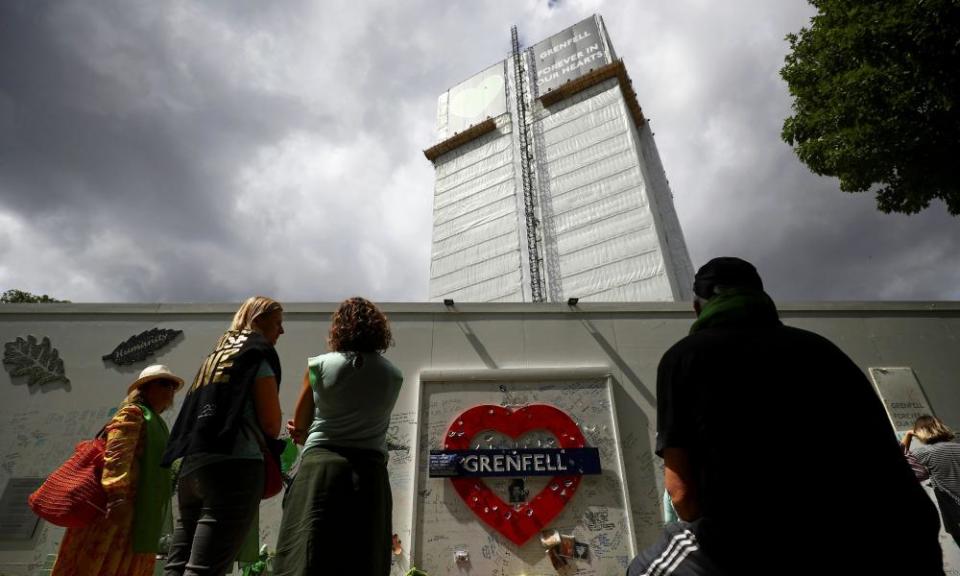Fire risk ‘cover-up’ one of ‘greatest scandals of our time’, Grenfell inquiry hears

The government may be guilty of a “deliberate cover-up” over the dangers posed by combustible materials before the Grenfell Tower fire and of allowing private companies to exploit building regulations in “one of the greatest scandals of our time”, the public inquiry has heard.
Successive administrations were responsible for “collusion” with the construction industry to suppress the results of investigations into earlier cladding fires, including at Lakanal House in south London in 2009 where six people died, said Stephanie Barwise QC, representing the bereaved and survivors at the opening of the final stage of the inquiry into the June 2017 Grenfell disaster.
Central government displayed “concealment instead of candour” and regarded fires “as something to be covered up” so building regulations allowing combustible materials to be used would not be scrutinised. She said the disaster was a “predictable yet unintended consequence of a combination of the laudable desire to reduce carbon emissions [by encouraging more insulating materials] coupled with an unbridled passion for deregulation”.
Michael Mansfield QC, representing other bereaved and survivors, told the inquiry the evidence would show “there was a deliberate policy by the government … to facilitate a hostile environment in which health and safety is diminished … and is seen as an obstruction to business”.
The claims came at the start of five months of hearings that will take evidence from former ministers including Eric Pickles and Gavin Barwell, who were in charge during the David Cameron and Theresa May governments.
Mansfield told the inquiry it needed to cross-examine David Cameron in person because of his policy of deregulation. Cameron gave a 2012 speech in which he said he would “kill off the health and safety culture for good”, describing it as “an albatross around the neck of British businesses”.
The inquiry has already heard allegations of how builders and designers failed to meet building regulations at Grenfell and allegations of how manufacturers manipulated certification systems to sell combustible materials.
Counsel to the inquiry, Richard Millett QC, used his opening remarks to warn that the Department for Levelling Up, Housing and Communities, led by Michael Gove, was trying to play “cat and mouse” with its evidence so far.
He questioned whether the written admissions by Gove’s department and the Home Office had been “drafted with fingers crossed” and suggested they were trying to “smuggle something past counsel to the inquiry, or counsel to the inquiry might miss a trick”.
Gove last month admitted to MPs that his department “will be seen to have, on a couple of occasions, not necessarily appreciated the importance of fire safety and not necessarily done everything in the wake of the Lakanal House tragedy that it should have done”.
Barwise said the evidence would show “wilful blindness” in government as ministers pushing for faster housebuilding and less regulation became a “junior partner [with the construction sector] … thereby permitting industry’s exploitation of the regulations”.
And she said that since at least 2014, the communities department “was fully on notice of both the widespread use of combustible insulation and the dangers and extensive use of aluminium composite materials”.
A key witness is likely to be Brian Martin, a senior government fire expert. Martin, who had been in charge of the fire regulations for 20 years by the time of Grenfell, had become “untouchable”, the inquiry heard.
He has since been promoted to head of technical policy, “despite presiding over one of the major scandals of our time”, said Barwise. Mansfield showed correspondence from 2014 in which Martin told a government minister not to meet with the late Sir David Amess, the MP who chaired the all-party fire safety group. It had written to the government 21 times, pressing it to tighten building regulations following Lakanal.
In early 2015, Amess wrote again to ministers, complaining of “continuous frustration over dismissive responses to its well-founded and justifiable concerns”. He was “whistling in the wind”, said Mansfield.
The inquiry continues.

 Yahoo Finance
Yahoo Finance 